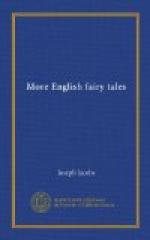“My daughter’s
spun seven, seven, seven,
My daughter’s
eaten seven, seven, seven,
And
all before daylight.”
A laird who chanced to be riding by, heard the exclamation, but could not understand it; so he rode up and asked the gudewife what was the matter, on which she broke out again—
“My daughter’s
spun seven, seven, seven,
My daughter’s
eaten seven, seven, seven
before daylight; and if ye dinna believe me, why come in and see it.” The laird, he alighted and went into the cottage, where he saw the yarn, and admired it so much he begged to see the spinner.
The mother dragged in her girl. He vowed he was lonely without a wife, and had long been in search of one who was a good spinner. So their troth was plighted, and the wedding took place soon afterwards, though the bride was in great fear that she should not prove so clever at her spinning-wheel as he expected. But old Dame Habetrot came to her aid. “Bring your bonny bridegroom to my cell,” said she to the young bride soon after her marriage; “he shall see what comes o’ spinning, and never will he tie you to the spinning-wheel.”
Accordingly the bride led her husband the next day to the flowery knoll, and bade him look through the self-bored stone. Great was his surprise to behold Habetrot dancing and jumping over her rock, singing all the time this ditty to her sisterhood, while they kept time with their spindles:—
“We who live in
dreary den,
Are
both rank and foul to see?
Hidden from the
glorious sun,
That
teems the fair earth’s canopie:
Ever must our
evenings lone
Be spent on the
colludie stone.
“Cheerless is
the evening grey
When
Causleen hath died away,
But ever bright
and ever fair
Are
they who breathe this evening air,
And lean upon
the self-bored stone
Unseen by all
but me alone.”
The song ended, Scantlie Mab asked Habetrot what she meant by the last line, “Unseen by all but we alone.”
“There is one,” replied Habetrot, “whom I bid to come here at this hour, and he has heard my song through the self-bored stone.” So saying she rose, opened another door, which was concealed by the roots of an old tree, and invited the pair to come in and see her family.
The laird was astonished at the weird-looking company, as he well might be, and inquired of one after another the cause of their strange lips. In a different tone of voice, and with a different twist of the mouth, each answered that it was occasioned by spinning. At least they tried to say so, but one grunted out “Nakasind,” and another “Owkasaaend,” while a third murmured “O-a-a-send.” All, however, made the bridegroom understand what was the cause of their ugliness; while Habetrot slily hinted that if his wife were allowed to spin, her pretty lips would grow out of shape too, and her pretty face get an ugsome look. So before he left the cave he vowed that his little wife should never touch a spinning-wheel, and he kept his word. She used to wander in the meadows by his side, or ride behind him over the hills, but all the flax grown on his land was sent to old Habetrot to be converted into yarn.




